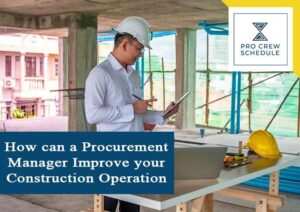A lot goes into managing construction projects. Among the many most crucial roles on a construction project is the procurement manager. Also known as the purchasing manager, procurement managers are professionals that handle logistics and the supply chain.
Generally, procurement managers consider purchasing all the necessary materials the project requires, looking for the best quality and cost-effective materials appropriate for each job. More than that, they have to make sure that the materials stay within budget and arrive on time. That part of the job is challenging because prices of materials in the construction world drastically fluctuate and seldom with a warning.
8 Responsibilities Of A Procurement Manager
On top of a procurement manager’s general responsibilities, they also have more specific and directed jobs.
1. Initiate the project
At the beginning of the construction project, a procurement manager must be assigned so they can kick off the procurement project. This stage involves getting the initial stakeholders together to identify and understand the procurement’s scope and objectives and discuss the goals and timelines for the project.
2. Create a Procurement Plan
Establishing is crucial for any project. Procurement managers must make a comprehensive procurement plan to align stakeholders and define expectations.
An effective procurement plan not only involves the process of acquiring goods and services. It also covers activities for post-procurement, which are necessary for effectively transitioning into business operations.
Although the transition plan may not come into play until after a solution or vendor is chosen, it’s still needed for the project’s overall success as that’s when the ideas are tested in practice.
3. Evaluate bids and RFPs
Part of a procurement strategy involves help in creating requests for proposals (RFPs), as well as evaluating bids.
This responsibility is significantly heavy because it sways the project’s profitability and the number of bids won. Bids too high can lose out to a competitor, while bids too low compromises the company’s profitability, which internal stakeholders don’t find appealing.
As the procurement manager, they have to provide input on costs associated with the proposed project used to prepare the bid or proposal, such as building materials cost.
When it comes to evaluating RPFs and bids, procurement managers must have an effective strategy, especially with the highly competitive nature of the industry today.
4. Manage resources
Procurement managers don’t only work on acquiring resources, but they are also involved in managing them. Part of the process is a construction procurement schedule, which lists the various items that need to be purchased and the schedule required so that they are available onsite when the time comes.
While a crew scheduler can help schedule tasks and monitor them, the construction procurement schedule can help make cash-flow plans. It can also include a timeline for line items like approvals, shop drawings, building permits, the project contract, and the contractual notice to move forward.
5. Coordinate schedules
It’s also a procurement manager’s job to define deadlines– to coordinate the procurement schedule with the project construction schedule and the project manager.
This part is key to the overall construction schedule and ultimate success of the project. For example, cement bags are not onsite when mixing concrete for the foundation walls. This can dramatically impact the entire project schedule and incur massive delays.
6. Collaborate with internal stakeholders and vendors
Large projects with complex procurements almost always have plenty of internal stakeholders. This collaboration begins with the business owner who initiated the procurement and the workers who will use the services or products.
Essentially, a procurement manager’s role ensures that all significant stakeholder groups are identified and engaged at the necessary times throughout the procurement process.
In addition to coordinating with the internal stakeholders, procurement managers must also collaborate with the vendors. They should make sure the vendors have appointed their project manager to serve as the contact person throughout the process. Then, procurement managers will coordinate with the vendors’ managers to schedule meetings and demos, get proposals, and facilitate the contracting process.
7. Monitor the project
Despite the position’s title, a project manager’s job does not end with materials and services procurement and resource management. They are also responsible for managing contracts, submittals, change orders, evaluations, and performance throughout the project’s building process.
The procurement managers can use the project data to collaborate with vendors, suppliers, and even clients to make any necessary alterations during construction, such as renegotiate contract terms and adjust deadlines and schedules. If things go wrong on-site, it can cost the project a lot of money.
Other than managing vital paperwork, creating submittals for hundreds of items is another responsibility procurement managers fulfill. This task is time-intensive, tedious, and taxing as teaching each submittal presents some challenges.
8. Communicating and updating
The procurement manager is the one in contact with the stakeholders and vendors, so it is their responsibility to communicate with them and keep them updated. Constant and clear communication is essential to keep all stakeholders on track and hit the deadlines.
This is where the importance of communication and analytical skills comes in. The procurement manager has to collect information from the stakeholders, determine what is essential to relay, and packaging and spreading it at the appropriate times.
With the Digital Age steadily growing, managers have plenty of channels to choose from to communicate. There are regular email updates, meetings (face-to-face or virtual), status reports templates, and various apps and software.
What Are Skills Of A Procurement Manager?
1. Financial skills
As the job heavily involves purchasing, procurement managers must have refined financial skills. Construction projects need to stay within budget and work with good-quality materials and other resources.
Procurement managers should be well-informed on departmental budgets and procurement costs. More than that, they should be able to interpret financial statements and manage budgets.
2. Leadership and management skills
Procurement managers do not only deal with materials, but they also handle teams. While managing and leading are not the same, procurement managers should possess both these abilities. They must have the competency to direct their people to do their jobs effectively so the procurement process progresses smoothly.
3. Negotiating skills
In line with working with finances, procurement managers should effectively negotiate with vendors and suppliers to get the best prices. To accomplish this, they should have excellent communication and people skills. This task will be easier if the people they are talking to feels comfortable with them. This includes projecting themselves as professional and trustworthy. Additionally, they should know the products and services in question to know the appropriate price range and the good-quality ones.
4. Communication skills
Communication and people skills are helpful when negotiating, but this skill transcends that. Because procurement managers constantly deal with people, it’s imperative that they have sharp communications skills.
As was said earlier, they have to communicate with the stakeholders and update them effectively. But communication is not a one-way line that involves conveying a message. Listening skills are also an essential part of the equation.
While discerning the vital information and determining the best way to communicate it are essential parts of the process, procurement managers should also listen. This allows them to react and respond appropriately, but they can get more information from vendors, suppliers, workers, and clients that can help the project. Miscommunication, or lack thereof, can be detrimental to the project.
5. Analytical skills
Part of a procurement manager’s job is to evaluate vendors, suppliers, bids, and RPFs. With several factors to consider, such as price, quality, and delivery, they should logically and practically see which ones are the best ones for the project.
How Construction Software Can Help
A procurement manager’s responsibility is not limited to purchasing and managing resources. In fact, they wear many hats on a construction site and tend to juggle several tasks.
Fortunately, their jobs can be made easier with construction management software. There is a plethora of software available that can improve the entire procurement process, from initial bits to closing out.
On top of automating tasks to boost efficiency, procurement managers can easily access important documents, like contracts, submittals, purchase orders, and change orders, as most software is cloud-based. Plus, scheduling and managing resources are done more fluidly because all data is in real-time. More than that, deadlines won’t be missed with reminders set up.
Construction software also uses information from past bids to create bidder documents quicker and smarter. They can quickly look at patterns from past bids lost and won to help find bids that you have a chance at winning. This will reduce wasted time on bids you’ll likely lose and unprofitable jobs.
If you are a contractor looking for effective subcontractor scheduling software, use Pro Crew Schedule’s Software. Sign up today and get a free 30-day trial with all its features and no strings attached. Request a demo here.







